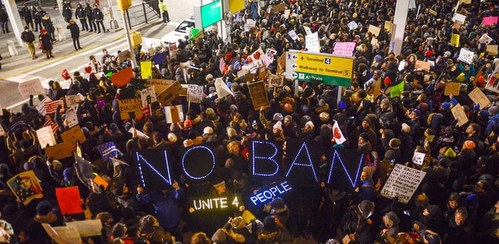Amnesty International (AI) and the Canadian Council for Refugees (CCR) released a brief today calling for Canada to suspend the Safe Third Country Agreement with the United States.
The 52-page brief, Contesting the Designation of the US as a Safe Third Country, outlines the many ways that the US asylum system and immigration detention regime fail to meet required international and Canadian legal standards. It highlights how law and practice have deteriorated further since President Donald Trump took office.
Despite many calls from refugee and human rights organizations and legal academics on both sides of the border following President Trump’s issuance of Executive Orders earlier this year, the Canadian government has repeatedly stated that there is no need to revisit the Agreement. Minister of Immigration, Refugees and Citizenship Ahmed Hussen has maintained that position following his review of the AI/CCR brief.
“We are shocked and disappointed that the Canadian government continues to hold to the view that the US is a safe partner for refugee protection,” said Alex Neve, Secretary General of Amnesty International Canada. “That was not true before President Trump took office and it has become abundantly clear that his presidency is characterized by utter disregard for the safety and rights of refugees and migrants. Our brief convincingly makes the case for the Safe Third Country Agreement to be suspended immediately.”
Under the Safe Third Country Agreement refugees who present themselves at a Canada-US border post seeking to make a refugee claim in Canada are, with limited exceptions, denied access to the Canadian refugee system and immediately returned to the United States. The Agreement does not apply to individuals who cross irregularly into Canada, other than at a border post, and subsequently make a refugee claim inside Canada. Those making irregular border crossings from the US face perilous situations in inclement weather and isolated locations, as well as exploitation by people smugglers.
“This Agreement encourages desperate people to take desperate measures which may put their safety and even their lives at risk,” said Loly Rico, President of the Canadian Council for Refugees. “From the perspectives of humanity, human rights and responsible border management, the Safe Third Country Agreement should be suspended. There has been no convincing explanation from the Canadian government as to why they will not take that step.”
The brief highlights fourteen major areas in which US practice falls short of international and Canadian legal standards, within the following six categories:
One-Year Bar – With limited exceptions, asylum seekers cannot make a claim if they have been within the United States for more than a year. The bar has a disproportionately harsh impact on certain refugees, including women and LGBTI claimants.
Expansion of Expedited Removal – these proceedings permit the removal of certain groups of non-citizens from the United States without a hearing before an Immigration Judge.
Detaining Asylum Seekers – detention is used unlawfully as a punitive and arbitrary measure; conditions and location of detention impede access to legal counsel. Serious deficiencies in detention conditions include inadequate access to medical care, prolonged confinement in holding cells, and prison like conditions with severe psychological impacts. New policies will substantially increase the use of immigration detention and exacerbate these problems.
Operation Streamline and Prosecution of Asylum Seekers – Contrary to international law, asylum-seekers face the risk of prosecution for “illegal” entry into the United States.
Inconsistent Recognition of Gender-Based Asylum Claims – There is an inconsistent record of recognizing claims of gender-based persecution.
Inconsistent Adjudication – rates of acceptance of similarly situated asylum claims vary dramatically between different regions. Some areas of the United States with exceedingly low acceptance rates are effectively “asylum free zones”.
To add your voice, participate in the online action here.
For further information please contact:
Sue Montgomery, Amnesty International 613-744-7667 ext 236
Janet Dench, Canadian Council for Refugees 514-277-7223 ext 2, 514-602-2098 (cell), jdench@ccrweb.ca






















